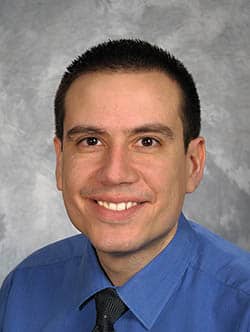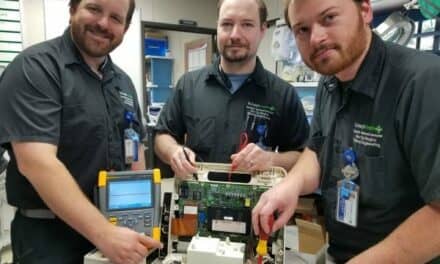 Like many American biomedical equipment repair technicians, I received my technical training in the military. I attended the United States Medical Equipment and Optical School at Fitzsimons Army Medical Center in the mid-1990s. After 8 years in the Army, I returned home to Oregon, got a job at the Portland VA Medical Center, earned a bachelor’s degree in English, and pondered where my career might go next.
Like many American biomedical equipment repair technicians, I received my technical training in the military. I attended the United States Medical Equipment and Optical School at Fitzsimons Army Medical Center in the mid-1990s. After 8 years in the Army, I returned home to Oregon, got a job at the Portland VA Medical Center, earned a bachelor’s degree in English, and pondered where my career might go next.
For years, I had noticed that biomeds often were left out of the loop when it comes to making hospital decisions. Part of this seems to emanate from our humble, behind-the-scenes approach to supporting the hospital and, sometimes, not being adamant about inserting ourselves into the conversation. But more important, I think, is a lack of awareness about what biomeds bring to the table, regardless of what hospital issue it might be.
As a biomed, I had many ideas about how things at the hospital could be improved. Often, it seemed, my ideas would fall on deaf ears, which grew more and more frustrating. Even as the shop supervisor, I did not have the power to influence many decisions to which I wanted to contribute. At times, I felt like there was a disconnect between the environment of the decision-makers and the reality of the hospital trenches that I worked in every day.
I realized that if I wanted to move up, I would need to go back to school. But in doing so, I recalibrated my traditional biomed thoughts about what “moving up” in the organization meant. I decided that instead of a technical degree, I would go for a Master of Health Administration (MHA) degree.
I surveyed various websites, read about different MHA programs, and tried to whittle down my options. I decided I would only attend schools accredited by the Commission for the Accreditation of Healthcare Management Education. My two options were to either leave work for a few years, take on loans, and hope that a lucrative job would allow me to pay them all off, or to keep working and pursue an executive MHA/MBA program on the weekends, far from home.
Fortunately, I learned of a third option, a rare opportunity offered by the Veterans Health Administration. In return for a service obligation, it will send selected candidates to the Army-Baylor University Graduate Program in Health and Business Administration, a dual MHA/MBA program at Fort Sam Houston in San Antonio. I researched the program requirements, took a Kaplan GMAT prep course, and assembled an application packet thicker than my mortgage. The selection process took almost a year, but I was chosen. Uncle Sam would be sending me to school once more.
I believe that a background in clinical engineering (or healthcare technology management, as it is now called), is an excellent foundation for entering an MHA program. Biomedical equipment technicians have to navigate a diverse set of clinical and nonclinical areas every day. They interact with nurses, doctors, ancillary health professionals, and, yes, patients. In all its aspects, biomeds are problem-solvers of healthcare, committed to doing whatever is needed to make things run smoothly. One of my former hospital commanders used to preach the delivery of “seamless healthcare,” and I firmly believe that all biomedical equipment technicians worth their salt are programmed to fulfill that role.
My grad program is preparing us to be able to meet future healthcare challenges. Our professors are teaching us about why the US healthcare “system” is the way it is, how it got there, and why it will be tough to change it in the future. We are being armed with C-suite-type skills, such as quantitative analysis, healthcare finance and accounting, managerial economics, and how to evaluate a business case. Our management skills are being honed with HR seminars, organizational behavior classes, and leadership courses. We’re even getting a heavy dose of jurisprudence and contract law!
Yet I have been dismayed to find that clinical engineering is rarely ever mentioned in either textbooks or lectures. Because of this, I believe my biomedical background adds a needed element to our classes. Many of my classmates, even the clinicians, are not familiar with all that biomedical equipment technicians can offer. After doing some research on the subject, I think I know why.
Healthcare administrators rarely mention clinical engineering in scholarly writings. Whereas clinical engineers regularly underscore the importance of clinical engineering involvement in clinical engineering journals and trade magazines, they rarely do so in journals actually aimed at the healthcare administrators they hope to reach. Year after year, MHA students are graduating with no idea of what a biomedical equipment technician is or how they can affect the organization.
Biomedical equipment technicians have a depth of experience in healthcare, a knack for problem-solving, and plenty of ideas on how to deliver the type of healthcare that you would want your loved ones to receive. If you are so inclined, I advise you to take these skills to the next level and pursue an MHA degree. It’s time to take the message of patient safety, clinician support, equipment uptime, cost containment, project management, IT savvy, and patient satisfaction from the basement to the C-suite. 24×7
Valdez Bravo is a former biomedical engineering supervisor, current graduate student, and frequent contributor to 24×7. For more information,
contact editorial director John Bethune at [email protected].





